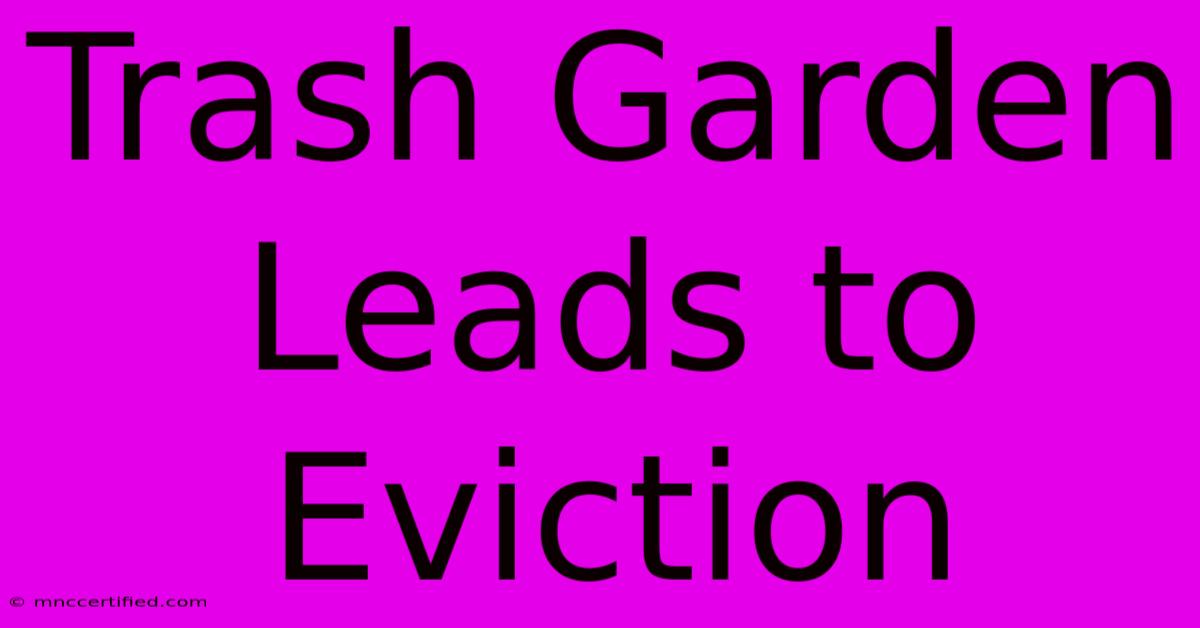Trash Garden Leads To Eviction

Table of Contents
Trash Garden Leads to Eviction: Navigating Legal and Landlord-Tenant Issues
A seemingly harmless hobby can quickly escalate into a serious legal battle. This is particularly true when that hobby involves creating a "trash garden," which, depending on its scale and location, can lead to eviction. This article explores the complexities of trash gardens, landlord-tenant laws, and how to avoid a potentially disastrous situation.
What Constitutes a "Trash Garden"?
Before delving into the legal aspects, let's define what a "trash garden" typically entails. While the term might conjure images of whimsical upcycled art installations, in most legal contexts, it refers to the accumulation of discarded materials—often considered junk or refuse—in a garden or yard space. This can include:
- Accumulation of garbage: Excess trash bags, discarded food containers, and other refuse.
- Hoarding of materials: Large piles of scrap metal, broken appliances, discarded furniture, etc.
- Unpermitted composting: While composting itself is generally beneficial, excessive or improperly managed composting can easily cross the line into a health hazard.
- Unkempt yard: A combination of overgrown weeds, debris, and discarded items leading to an overall unsightly and potentially dangerous condition.
Legal Ramifications and Landlord-Tenant Rights
Landlord-tenant laws vary significantly by location (state and even municipality). However, most jurisdictions recognize a landlord's right to maintain a habitable and safe property for all tenants. A trash garden, depending on its severity, can violate lease agreements in several ways:
- Breach of Lease: Most leases explicitly prohibit the accumulation of trash and debris that creates a health hazard, fire hazard, or negatively impacts the property's aesthetic value.
- Health Code Violations: Excessive trash can attract vermin, insects, and create unsanitary conditions, leading to violations of local health codes. Landlords may be fined for allowing such violations on their property.
- Safety Hazards: Piles of discarded materials can create tripping hazards, obstruct walkways, and pose fire risks, creating unsafe conditions for other tenants and potentially leading to liability for the landlord.
Eviction as a Last Resort
While eviction is a drastic measure, landlords are often legally justified in pursuing this action if a tenant persistently fails to comply with requests to clean up a trash garden. It's crucial to understand that landlords are usually required to provide written notice and an opportunity to remedy the situation before initiating eviction proceedings.
Avoiding Eviction: A Proactive Approach
The best way to avoid a trash garden leading to eviction is prevention. Here are some crucial steps to take:
- Read your lease carefully: Understand the specific clauses regarding property maintenance and waste disposal.
- Communicate with your landlord: Before starting any ambitious landscaping or upcycling projects, discuss your plans with your landlord to ensure compliance.
- Maintain a clean and organized yard: Regularly dispose of trash and maintain a tidy property.
- Follow local ordinances: Familiarize yourself with local health and safety regulations regarding waste disposal and yard maintenance.
- Seek alternative solutions: Explore legal and safe ways to upcycle materials if you have a passion for repurposing. Consider community composting programs or donation centers for unwanted items.
Seeking Legal Advice
If you're facing eviction due to a perceived "trash garden," seek legal counsel immediately. An attorney specializing in landlord-tenant disputes can advise you on your rights and options. Similarly, landlords facing issues with a tenant's property should consult legal professionals to understand the proper procedure for addressing violations and potential eviction.
Disclaimer: This article provides general information and does not constitute legal advice. Laws vary significantly by jurisdiction, and consulting with a legal professional is essential for specific situations.
This comprehensive guide covers the necessary keywords (Trash Garden, Eviction, Landlord, Tenant, Legal Ramifications, Health Code Violations, Lease Agreement) organically throughout the text, ensuring a strong SEO presence without compromising readability. The use of headers, bold text, and lists enhances readability and engagement. Remember to use relevant and high-quality backlinks to authoritative sources (e.g., local government websites, legal organizations) to further strengthen SEO.

Thank you for visiting our website wich cover about Trash Garden Leads To Eviction. We hope the information provided has been useful to you. Feel free to contact us if you have any questions or need further assistance. See you next time and dont miss to bookmark.
Featured Posts
-
Rain And Storms Threaten Southern Plains
Nov 18, 2024
-
Mojtaba Khamenei Irans Next Supreme Leader
Nov 18, 2024
-
Tennessee Contractor License Bond
Nov 18, 2024
-
Grand Slam Darts Littler Vs Lukeman
Nov 18, 2024
-
I M A Celebrity 2024 Tulisas Post X Factor Life
Nov 18, 2024